
New research published in the journal JAMA Oncology explores the link between inflammation-inducing diets and the risk of developing colon cancer.
The study was led by Fred K. Tabung, Ph.D., of the Harvard T.H. Chan School of Public Health in Boston, MA.
Tabung and team started from the observation that inflammation is known to contribute to cancer in general and colorectal cancer in particular — a fact well-documented by researchers.
So, they wondered whether proinflammatory diets would have a similar effect on the risk of colon cancer. To investigate this, they assessed the inflammatory components of diets using an empirical dietary inflammatory pattern (EDIP) score.
The EDIP score was based on 18 food groups. Meat, fish that is not dark meat, vegetables that are not leafy greens or dark yellow, refined grains, and both high- and low-energy beverages such as soft drinks all correlated positively with high inflammatory markers.
By contrast, “Intakes of beer, wine, tea, coffee, dark yellow vegetables (comprising carrots, yellow squash, and sweet potatoes), green leafy vegetables, snacks, fruit juice, and pizza were inversely related to concentrations of the inflammatory markers.”
The researchers used two prospective cohort studies — the Nurses’ Health Study and the Health Professionals Follow-up Study — to obtain information about dietary patterns from more than 120,000 adults.
Subjects were clinically followed for 26 years, and every 4 years they received food questionnaires. To study the link between their diet and risk of colon cancer, Tabung and his colleagues used Cox regression models.
The researchers also divided the participants into different alcohol intake and body weight groups, analyzing potential associations between diet and colon cancer risk within these categories.
Colon cancer risk raised by 32 percent
Overall, during the follow-up, 2,699 cases of colon cancer were recorded. Proinflammatory diets correlated with a higher risk of colorectal cancer in both men and women.
More specifically, men and women in the highest proinflammatory quintile — or fifth — of the EDIP score were 32 percent more likely to develop colon cancer compared with men and women in the lowest quintile.
By gender, men who consumed the most proinflammatory diets were 44 percent more likely to develop cancer than men in the lowest quintile of the EDIP score, and women were 22 percent more likely.
As Tabung and his colleagues explain:
“Findings from this large prospective study support a role for the inflammatory potential of diet in colorectal cancer development, suggesting inflammation as a potential mechanism linking dietary patterns and colorectal cancer development.”
They say, “Strategies to reduce the adverse role of a proinflammatory dietary pattern in colorectal cancer development may have higher benefits among overweight or obese men and among lean women or among men and women not consuming alcohol.”
Strengths and limitations of the study
“Major strengths of our study include the use of a food-based EDIP score that is correlated with levels of inflammatory markers associated with colorectal cancer risk,” the authors write.
Also, the fact that these dietary data were collected at different points throughout the follow-up minimizes the impact of variations within each participant.
However, given that the data on their diet and lifestyle were self-reported by the participants, the information is prone to bias, admit the researchers.
Finally, given the observational nature of the study, the findings cannot explain causality.
[“source=google”]
